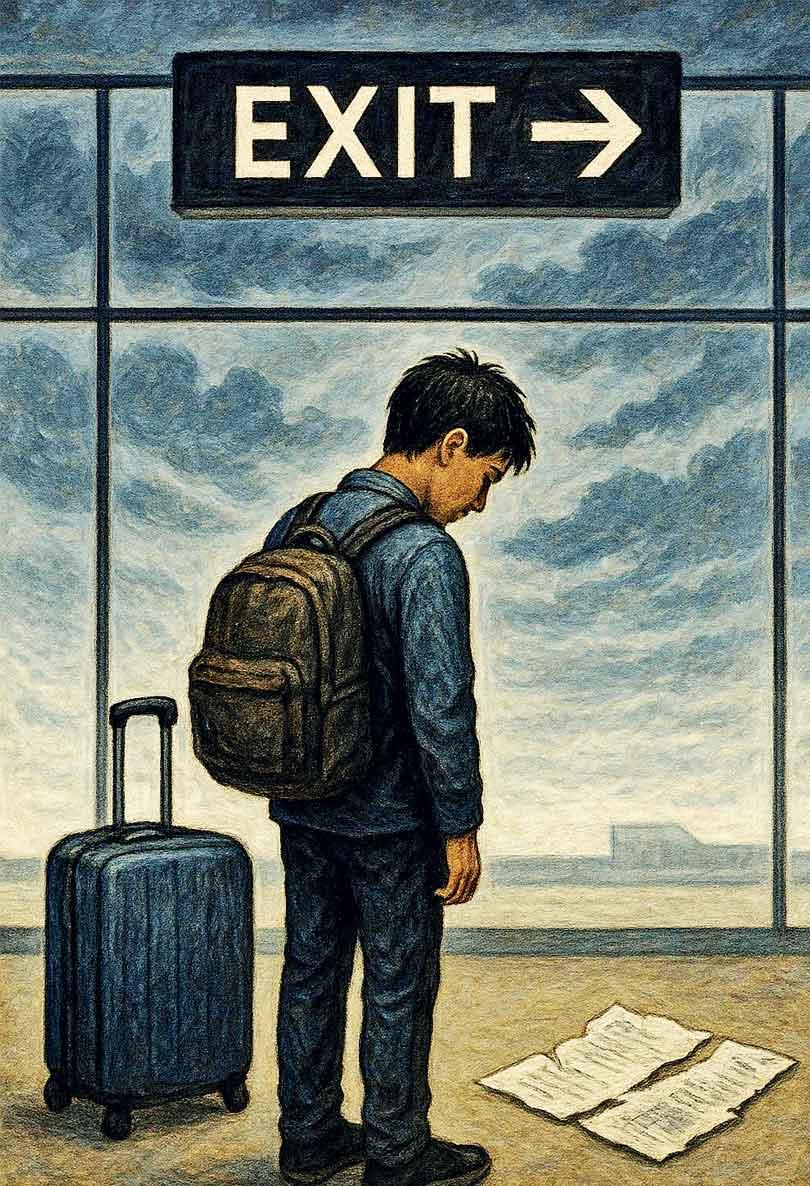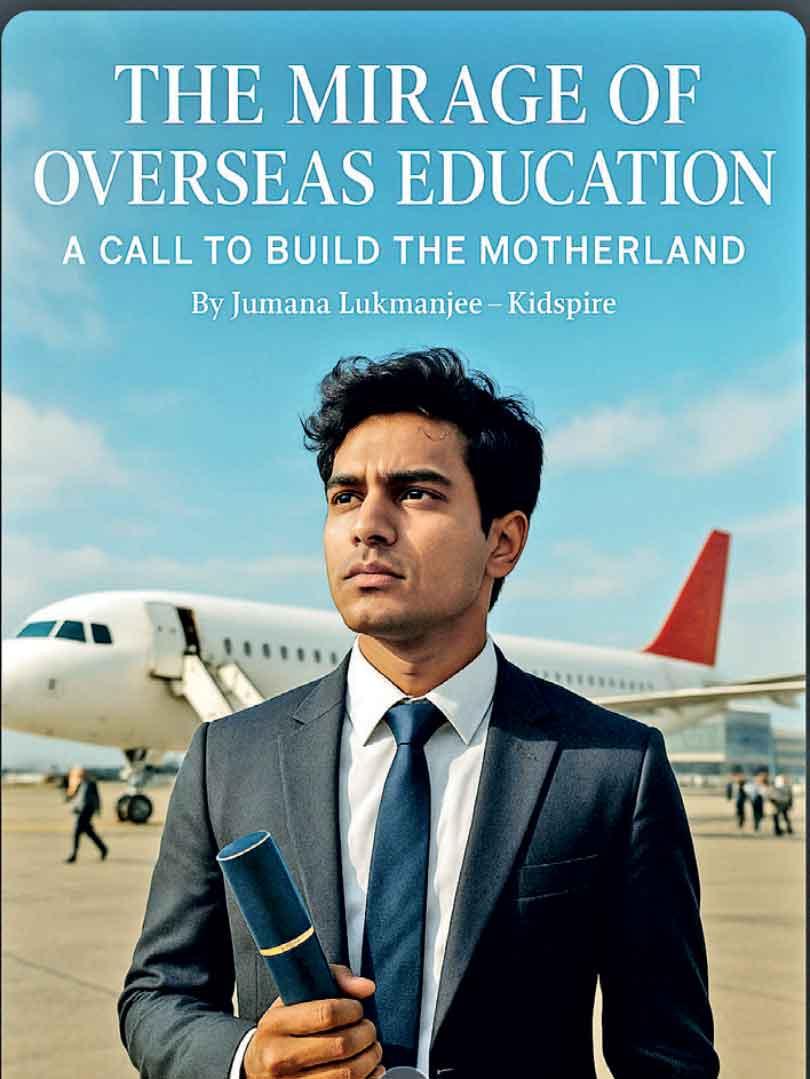

 Every year, thousands of young Sri Lankans board planes with trembling hands and hopeful eyes, clutching dreams wrapped in acceptance letters from foreign universities. The glittering promise of overseas education, the world-class degrees, the prestige, the supposed “better life” gleams like gold in their imaginations. Parents sacrifice fortunes, siblings say tearful goodbyes, and entire families wait for the glorious day when their child will return home, diploma in hand, to build a brighter future. But reality, as it often does, paints a different picture. For many, the dream soon begins to crack. Behind the glossy brochures and fancy campuses lies a truth few are prepared for: alienation, financial struggle, and a world that often refuses to embrace them as equals. The foreign dream can be a cold one. Students find themselves cleaning tables after midnight to pay rent, missing family milestones, and living in quiet loneliness. And when the cap and gown come off, they realize that the “promised land” does not always promise them a place. Some are forced to return home, not as the triumphant scholars they imagined, but as weary souls burdened by debt and disillusionment.
Every year, thousands of young Sri Lankans board planes with trembling hands and hopeful eyes, clutching dreams wrapped in acceptance letters from foreign universities. The glittering promise of overseas education, the world-class degrees, the prestige, the supposed “better life” gleams like gold in their imaginations. Parents sacrifice fortunes, siblings say tearful goodbyes, and entire families wait for the glorious day when their child will return home, diploma in hand, to build a brighter future. But reality, as it often does, paints a different picture. For many, the dream soon begins to crack. Behind the glossy brochures and fancy campuses lies a truth few are prepared for: alienation, financial struggle, and a world that often refuses to embrace them as equals. The foreign dream can be a cold one. Students find themselves cleaning tables after midnight to pay rent, missing family milestones, and living in quiet loneliness. And when the cap and gown come off, they realize that the “promised land” does not always promise them a place. Some are forced to return home, not as the triumphant scholars they imagined, but as weary souls burdened by debt and disillusionment.
The Price of a Foreign Dream
Overseas education, for all its glamour, comes at a cost far greater than money. It costs youth, belonging, and sometimes, identity. Parents mortgage their homes and drain their savings, believing that a foreign degree guarantees success. Yet, in truth, a degree earned abroad is only as valuable as what one does with it. In recent years, an increasing number of Sri Lankan graduates have been returning home after realizing that foreign lands are not always paved with opportunity. Immigration policies tighten, job markets overflow, and cultural barriers rise like invisible walls. Some return not out of choice, but necessity, their student visas expired, their funds depleted, their hopes dimmed. They come home to find that the job market they left behind has moved on. The local companies do not always recognize or reward their foreign degrees. Worse still, they discover a painful irony: while they were studying abroad to “find a better future,” their homeland had begun to build one without them.
Home Is Where the Change Begins
Why, then, should we not turn our eyes inward, to the soil that raised us, the schools that nurtured us, and the communities that shaped us? Sri Lanka, despite its challenges, is rich with opportunity for those who dare to see it. Our universities, though often underestimated, produce doctors, engineers, teachers, and thinkers who serve not just themselves but their nation. Education here is not just about earning a degree; it’s about learning to lead, to solve, to serve. Imagine what could happen if the brilliant minds that now scatter across the globe decided instead to stay, to build startups, reform systems, teach in schools, innovate in labs, and serve in hospitals. Imagine if every child who dreamed of London, Sydney, or Toronto began to dream instead of a stronger, smarter, self-reliant Sri Lanka. That would be a revolution, not of protest, but of purpose.
Foreign Degrees vs. Local Impact
Yes, overseas universities often offer cutting-edge research, exposure, and global networks. But knowledge, by itself, is sterile unless planted in the soil of one’s homeland. What use is a PhD from Cambridge if it serves no one in Kandy? What value has an MBA from Melbourne if it never fuels a business in Colombo? True education is not about escaping; it is about empowering. The measure of a scholar is not how far they go, but how deeply they return. Sadly, many of those who leave never come back, or come back only to complain that “nothing ever changes here.” But change is not something you find; it is something you create. It grows from commitment, not convenience.
The Returnees: Lessons from the Lost
Speak to those who have returned from abroad, and you will hear a mix of pride and regret. Some carry a newfound appreciation for the simplicity of home, the warmth of family meals, the kindness of neighbors, the sense of belonging that no foreign paycheck can buy. Others return with a quiet bitterness, realizing that the world they sacrificed everything to join never truly accepted them. These returnees tell stories of struggle, of working three jobs to pay tuition, of facing discrimination, of feeling invisible. Many confess that they were happier here, where the air smells like familiarity, and a smile costs nothing. Their experiences are powerful reminders: the grass is not always greener on the other side. Sometimes, it’s greener where you water it.
A Call to the Young Dreamers
To the students standing on the edge of decision, to those burning with ambition and curiosity, this is not a call to abandon your dreams. It is a call to redefine them. If you wish to study abroad, do it with purpose. Go to learn, not to escape. Go with the intent to return, to bring back what you have learned and use it to transform your homeland. But if your reason for leaving is merely the illusion that “foreign means better,” then pause. Look around you. The same brilliance you seek abroad can be found in our own universities, among our own mentors, and within your own determination. There is dignity in staying. There is pride in serving.
Building the Future from Within
Sri Lanka does not lack talent; it lacks those willing to believe in its potential. Every student who chooses to study here, to work here, to create here, is a pillar of progress. Every young mind that stays is an act of resistance against the notion that greatness exists only elsewhere. The world may tempt you with its glitter but remember even the brightest stars are best seen from home. Let us stop exporting our dreams and start planting them here. Let us turn our classrooms into incubators of innovation, our universities into beacons of knowledge, and our youth into the architects of a stronger nation. Because in the end, it is not foreign degrees that will rebuild Sri Lanka, it is the hands, hearts, and hopes of those who choose to stay.
Conclusion: The True Measure of Education
Education, at its core, is not about distance or prestige. It is about transformation, of self and society. Whether earned in Colombo or Cambridge, knowledge holds value only when it serves humanity. So, to every young Sri Lankan dreaming of foreign shores: remember, the real adventure is not out there. It is here, in the challenge of building, the beauty of belonging, and the courage of commitment. Stay. Learn. Lead. Serve. Because the future of Sri Lanka does not lie in foreign lands. It lies, gloriously, powerfully, and patiently, in you.










